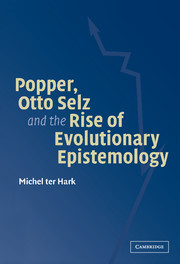Book contents
- Frontmatter
- Contents
- List of Illustrations
- Preface
- 1 Tracing the Genesis of an Idea
- 2 Psychology of Thinking, Evolutionary Theory, and Psychoanalysis
- 3 Popper and the Foundations of Pedagogy
- 4 Otto Selz and the Science of Problem Solving
- 5 Popper's Psychology of Knowledge
- 6 Evolutionary Epistemology and the Mind-Body Problem
- Notes
- Bibliography
- Index
2 - Psychology of Thinking, Evolutionary Theory, and Psychoanalysis
Published online by Cambridge University Press: 07 December 2009
- Frontmatter
- Contents
- List of Illustrations
- Preface
- 1 Tracing the Genesis of an Idea
- 2 Psychology of Thinking, Evolutionary Theory, and Psychoanalysis
- 3 Popper and the Foundations of Pedagogy
- 4 Otto Selz and the Science of Problem Solving
- 5 Popper's Psychology of Knowledge
- 6 Evolutionary Epistemology and the Mind-Body Problem
- Notes
- Bibliography
- Index
Summary
The Würzburg School
Only against the background of the prior history of psychology, with its development of sensualism and associationism by Wilhelm Max Wundt (1832–1920), Hermann Ebbinghaus (1850–1909), and G. E. Müller (1850–1934), can the achievements of the psychology of thinking be properly understood. By the 1880s orthodox experimental psychology was the psychology of Wundt and, in his footsteps, Müller and Ebbinghaus. Wundt had defined psychology as the science of immediate experience. In analysing experience into its ultimate elements and in formulating the laws in accordance with which these elements are combined, Wundt leaned heavily on sensationalism and associationism. The idea of knowledge as ultimately knowledge of sensations was, of course, one with a long, ultimately Lockean pedigree, just as the idea of the constant conjunction of two sensations in the past determining our future experience or thought was firmly located in the English associationist tradition in philosophy. It had become axiomatic in psychology that the principles connecting our thoughts are mechanical, and the Kantian idea that the mind proceeds from one object of thought to another by some rational path of connection was beginning to look like a form of naiveté discordant with the tendencies of scientific thought.
William James mocked this Kantianism: “The trueness of this formula is only equalled by its sterility, for psychological purposes. Practically it amounts to simply referring the inquirer to the relations between facts or things, and to telling him that his thinking follows them.”
- Type
- Chapter
- Information
- Publisher: Cambridge University PressPrint publication year: 2003



